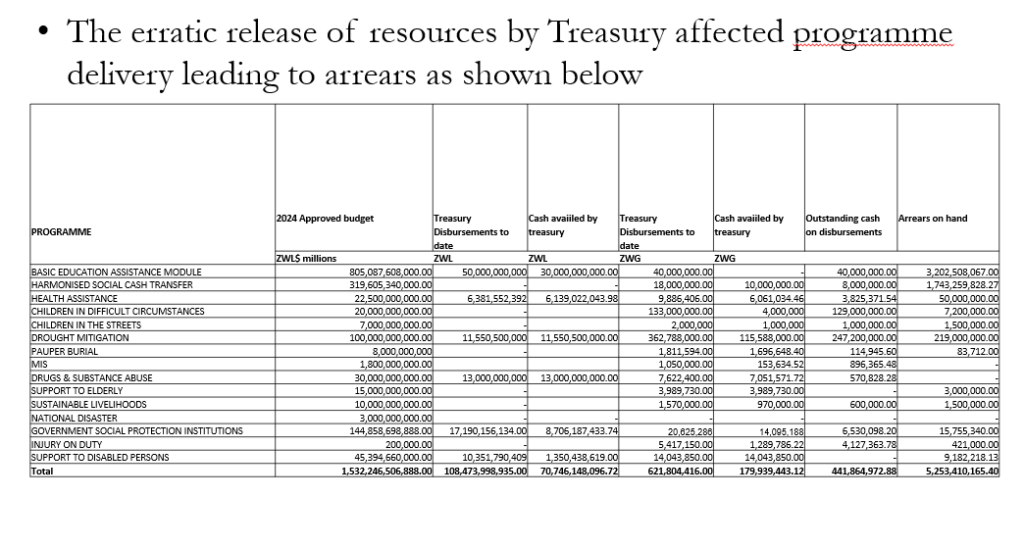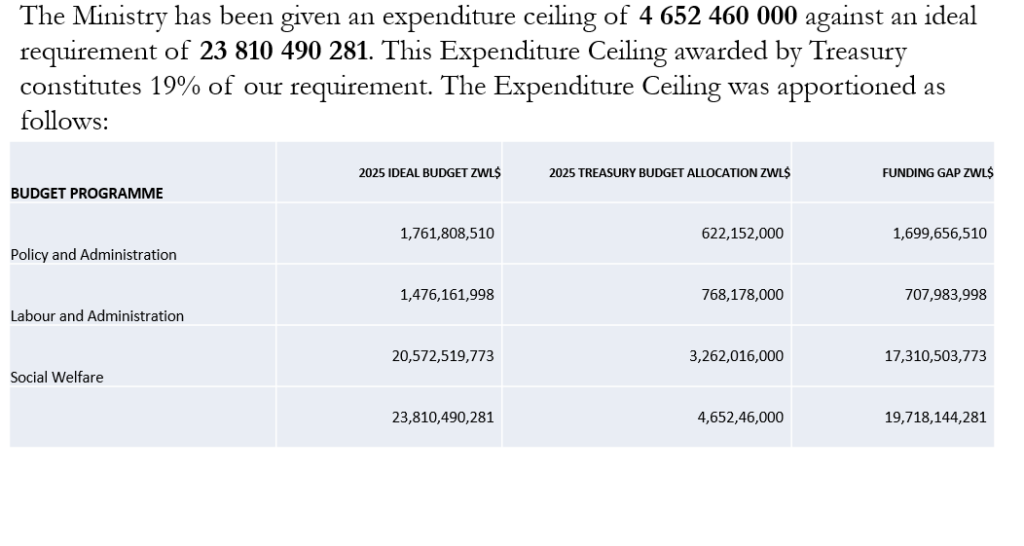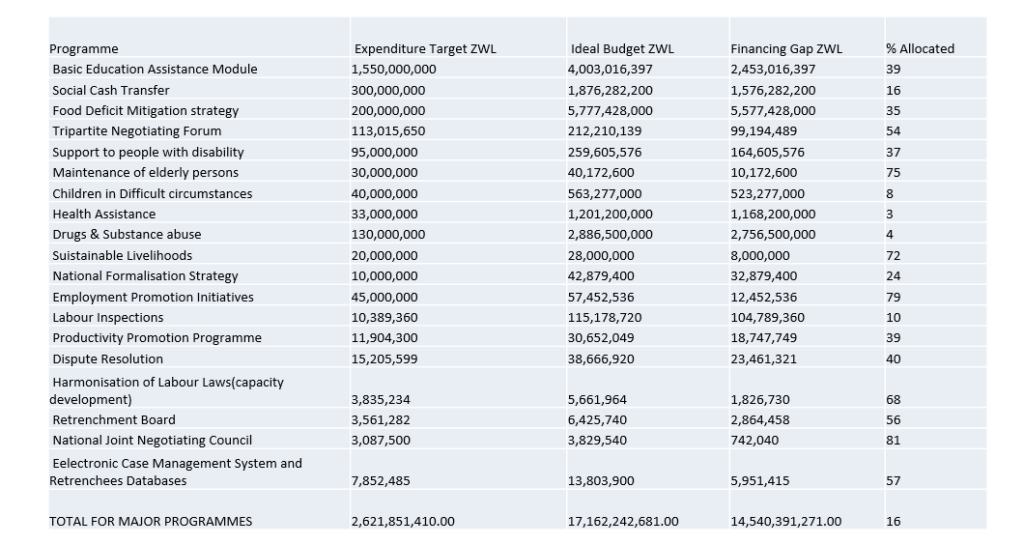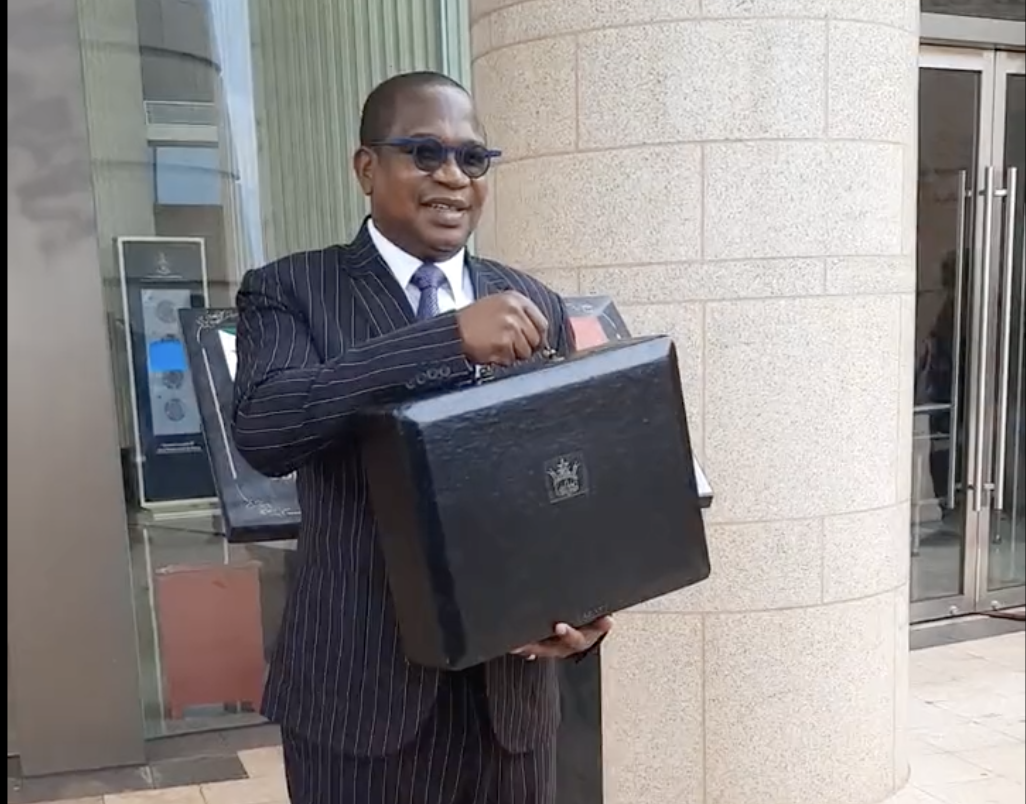The Ministry of Public Service, Labour, and Social Welfare, has voiced alarm about delayed Treasury disbursements, affecting the delivery of social welfare projects and intended beneficiaries across Zimbabwe.
Presenting at a recent pre-budget seminar in Bulawayo on responses to matters arising from the 2024 Budget consultations, the Minister of Public Service, Labour and Social Welfare July Moyo pointed to a concerning gap in funding, highlighted in the ministry’s 2024 expenditure graph, which shows a consistent lag between planned and actual fund allocations.
These budgetary shortfalls, Moyo noted, have resulted in major arrears and impeded critical services for vulnerable communities.
The erratic disbursement has led to major arrears, as demonstrated by the ministry’s 2024 expenditure graph, showing a consistent lag in expected versus actual funds received.

The graph reveals a stark contrast in planned disbursements versus the actual allocations, painting a picture of budgetary constraints that hinder the ministry’s ability to deliver critical services.
Despite these challenges, Moyo reported on various social welfare initiatives.
Under food distribution, grain was provided to 5.5 million food-insecure rural households during an initial “blitz.”
Currently, a third round of distribution is underway, aiming to reach 9.2 million people.
The minister said urban food relief is also progressing with the registration of food-insecure households for the Urban Cash for Cereals programme, which has reached 30 000 people so far through cash transfers.
“In healthcare, 18 023 individuals received medical assistance, while social support extended to 16 896 refugees and asylum seekers,” he said.
However, Moyo stressed that the social welfare ministry faces significant obstacles.
“Service delivery has been compromised by the ongoing skills flight, particularly among social workers and labour officers, as well as a shortage of critical resources like furniture and office supplies,” he said.
Additionally, inconsistencies in grading provincial heads compared to counterparts in other ministries have caused internal challenges.
“Some are Deputy Directors whilst others are Directors and still others are Chief Directors,” the minister said.
The ministry’s financial limitations are further underlined by the Treasury’s ceiling of ZWL 4.65 billion against the ministry’s ideal requirement of ZWL 23.81 billion – only 19 percent of the needed budget.
Moyo emphasised that this funding shortfall limits programme scalability and service reach, urging for a more balanced approach in the upcoming budget to meet the pressing needs of Zimbabwe’s vulnerable communities.


The minister also announced a comprehensive list of priorities aimed at strengthening Zimbabwe’s social welfare, labour, and public service infrastructure for 2025.
These priorities reflect a focus on addressing issues from drug abuse to child protection and labour rights as part of a broader mission to improve the lives of vulnerable communities and provide compliance with international standards.
A key priority is the establishment of a Drug and Substance Abuse Agency, designed to address the escalating crisis of drug abuse nationwide.
In tandem, the ministry plans to increase access to outpatient rehabilitation and psychosocial support centres, as well as expand community-based support for individuals struggling with substance dependency.
Labour reforms are also set to take centre stage as Minister Moyo emphasised the need for improved labour inspection by both the Labour Department and the National Social Security Authority (NSSA).
Plans include increased joint inspections, training in labour law, and an electronic case management system to expedite the resolution of labour disputes.
Furthermore, the ministry aims to operationalise the Zimbabwe National Productivity Institute (ZNPI), to provide productivity training across industries, and pursue the creation of a social contract through the Tripartite Negotiating Forum (TNF).
“Monitoring and evaluation will be critical for all ministry programmes, ensuring policies align with both government mandates and the needs of citizens,” Moyo noted.
The 2025 agenda includes reviewing the National Social Protection Policy Framework and developing Standard Operating Procedures for social protection programming.
Addressing child welfare is another focal point, with plans to strengthen the National Case Management System for the welfare of vulnerable children, develop a multi-sectoral strategy for children living and working on the streets, and launch the After Care Policy.
The ministry will also work on international collaborations and develop state reports for the United Nations on child rights, the African Charter on the Rights and Welfare of the Child, and the UN Convention on the Rights of Persons with Disabilities.
In education, Moyo highlighted the expansion of the Basic Education Assistance Module (BEAM) to make sure vulnerable children receive needed support.
Efforts will also focus on strengthening social assistance programmes, merging the Monthly Maintenance Allowance (MMA) with the Harmonised Social Cash Transfer (HSCT) into a unified cash transfer programme, and creating a Social Protection Single Registry and an Integrated Social Protection Management Information System for streamlined service delivery.
Additionally, the ministry will continue monitoring Private Voluntary Organisations for compliance, registering foster care and residential facilities for children, elderly persons, and those with disabilities, and bolstering support for refugees and asylum seekers.
Moyo said, “The ministry is committed to joint implementation of programmes with partners to maximise efficiency.”
This holistic approach, Minister Moyo explained, will also involve “refurbishing care facilities to meet residential standards, enhancing the capacity of social development staff, and improving the efficiency of injury-on-duty claim processing.”

